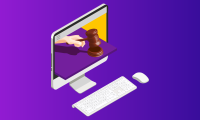What Are Cookies? Types, Importance, and Privacy Concerns Explained
Cookies- the online ghost that haunts users everywhere they go. Or is it just a friendly Casper trying to make online surfing more convenient? Let’s straighten that out today.
What are these cookies? What purpose do they serve? Is someone keeping a track of people’s online pursuits?
Let’s decode this together…
What are cookies?
Cookies are small text files that a website sends to a device that the site later uses to monitor and retain certain information about the users. Cookies are the reason many websites can perform data collection. They store information like registrations, credentials, shopping cart information, payment information, etc.
Now, why are they called cookies?
Honestly, the nomenclature completely makes sense. The word ‘cookie’ was coined in 1994, by Lou Montulli, a web browser programmer. It is derived from the word ‘magic cookie’ which was again derived from the word and food ‘fortune cookie’. Magic cookies refer to chunks of data a program exchanges which is exactly like the embedded messages that fortune cookies contain.
What is the purpose of cookies on a publisher’s website?
When users visit a website, the cookies save their information and their interactions in the form of a cookie file and send it to the server which is used to enhance people’s online experience. The data stored in cookies is labeled with a unique ID. When the cookies are exchanged between the devices and the network servers, the server reads this ID and presents information specifically relevant to the users.
The purpose is to customize and enhance the user experience of users and make their revisits more personal. Publishers can use these cookies to understand customer preferences, behavior, and the journey that can be further utilized for personalized targeting.
When we talk about cookies, we mean it in a broader sense. There are different types of cookies on different websites, each of which has a significant role to play.
Why are cookies important?
Cookies add convenience to the user’s time on the website. Without them, the eCommerce industry would not have come this far. The data collected by these cookies are beneficial for all- users, publishers and advertisers. They help in the personalization of content, ads and increase revenue by tracking user activity. But not every cookie is meant to do so.
Different types of cookies perform different functions and it is important to know them well. Some cookies can be hostile or not safe enough. However, there is no such thing as a ‘bad’ cookie. It’s all about how the collected data is distributed, used, or kept secure.
Here are some of the most popular types of cookies in the ad tech industry
- Session Cookies
Session cookies, also known as temporary cookies are exactly as the name suggests. These cookies last only for as long as the user is on the browser. Once the user shuts down the page, these cookies are no longer functional. Unlike other cookies, session cookies are not stored on the user’s device. Hence, whatever information they provide to the website will be forgotten by the website.
The session cookie only tracks the website movement and not any other information. For instance, when a user visits an eCommerce website that uses session cookies, their activities are tracked using a session ID. Information like products added to the cart is stored using these cookies. But if the user does not complete the purchase then the cart information will be lost as soon as they leave the site. The session cookies let users add products to the shopping cart without logging into the website.
- Persistent Cookies
Persistent cookies, also known as permanent cookies are the complete opposite of session cookies. Unlike session cookies, persistent cookies store the information on the device computer even after the user has closed the browser. These cookies are designed to remember user preferences for a specific period of time.
Let’s consider the ecommerce example here. When users visit a website that uses persistent cookies, their cart information, wishlist selections, login credentials, and card details are stored on the device. So even if they leave the website without completing the purchase, the cart information still remains intact.
Persistent cookies can save these details only after the user gives permission. These cookies too have an expiration like session cookies. However, persistent cookies last much longer and the expiration date is set by the web server.
- Secure Cookies
Secure cookies are a type of HTTP cookie that limits its transmission to secure channels (typically HTTPS). These cookies are often responsible for collecting crucial information like passwords, login credentials, or payment details. To ensure that this data stays safe and is transmitted only to encrypted connections, almost all the websites activate the ‘secure attribute’.
This attribute along with httpOnly flag is responsible to keep the secure cookie data safe from malicious connections by restricting access. HttpOnly also restricts cross-site scripting (XSS) which makes sure that non-HTTP methods cannot access the cookie.
- Zombie Cookies
Zombie cookies are the type of cookies that would hold their ground no matter what. So, they can be very tough to discard even after multiple attempts. And that’s how they get their name. Zombie cookie evolves from another type of cookie- the Flash cookie. This cookie tracks the users across the internet using unique IDs and Quantcast technology.
This technology saves the unique user ID in the Adobe Flash player storage bin. When the user tries to delete this flash cookie, Quantcast Technology recovers the IDs and activates them to track the user’s browsing history.
- Third-party cookies
Third-party cookies are the most common cookie that the internet is aware of. Third-party cookies are installed on a website to track audience data typically for marketing strategies. It simply means that the assigned cookies do not belong to the website owner but to an entity outside of it.
These cookies help third parties analyze the customer journey and endorse the right ads to them or improve their user experience on the internet. However, third-party cookies raise potential privacy concerns for the users. Generally, people trust first-party cookies more than they trust third-party cookies as first-party cookies actually help with enhanced user experience.
- First-party cookies
First-party cookies are the future of programmatic advertising. These cookies are owned by the website owners and directly collect data from the visitor through varied channels. These cookies help in contextual targeting which enhances the user experience and generates more ad revenue for publishers.
The top benefit of first-party cookies is that this data is only used by the website owner and not shared with another party. The collected data helps in customer retention, showing relevant ads, and building Walled Gardens.
What are the privacy options available online for cookies?
Cookies are infamously known for negatively impacting user privacy. They are believed to be the non-tangible spies of the internet. It’s true that cookies can come in the way of safe internet surfing. But there are some simple privacy options available that can help users manage these cookies.
- Changing the browser’s privacy and security settings.
- Block the cookies altogether.
- Allow cookies on a site-to-site basis.
- Block only third-party cookies.
- Get Google extensions that automatically delete cookies after leaving the site.
- Last, users can simply go incognito.
To wrap up…
Cookies are essential. They are good. But blindingly allowing cookies on the website can lead to data infiltration. The only way to avoid this is for the users to be mindful of these cookies. Similarly, publishers are responsible for the types of cookies they use and how they use the data acquired from them. Especially, when they use third-party cookies. But soon they will have to get acquainted with first-party cookies because sooner or later they will have to bid their farewells to the third-party cookies.
Yes, that’s possible. Google is in the process of eliminating third-party cookies by the end of 2023. Browsers like Safari have already done so and have successfully made it on first-party cookies. It’s not just the browsers but also many businesses and websites that are using first-party cookies to build a Walled Garden.
Cookies are more dynamic than people think. All types of cookies have been directed toward providing a customized user experience. As a user, it is always best to be cautious of what to ‘accept’ on the internet. As long as people do that, cookies will only make their online journey a smooth sail.




Leave a Reply